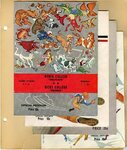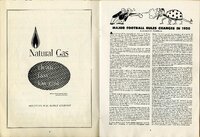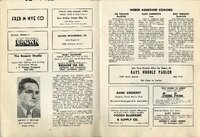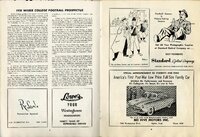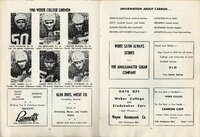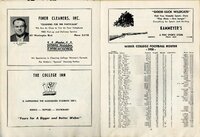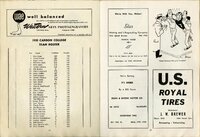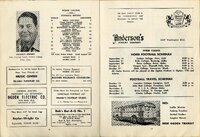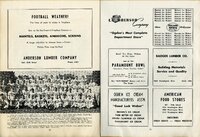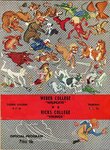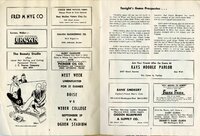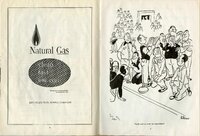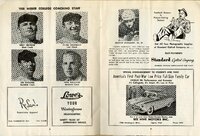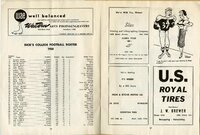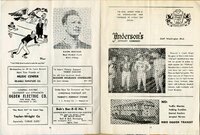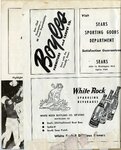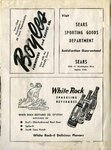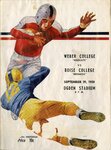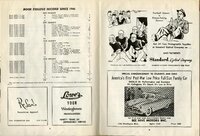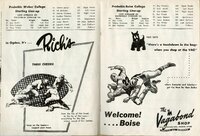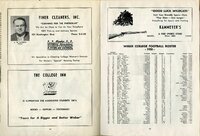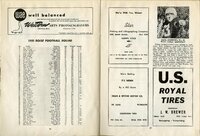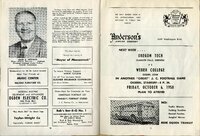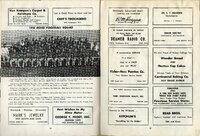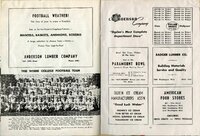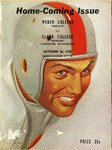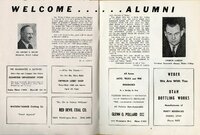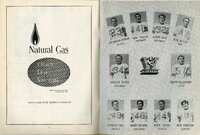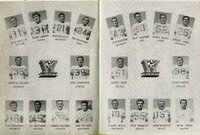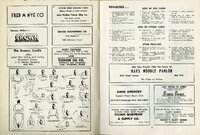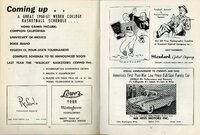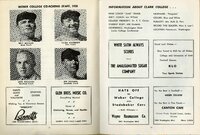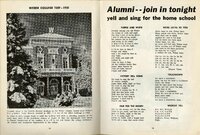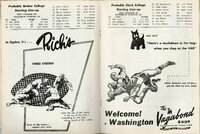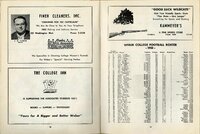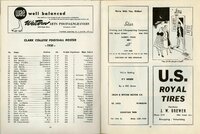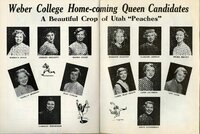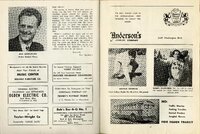| Title |
046_Football Programs 1950 |
| Creator |
Weber College |
| Contributors |
Weber College; Whip Club |
| Description |
This Collection consists of a 119 page Scrapbook put together by members of the Weber College Whip Club, the school's pep club, covering the years between 1946 and 1955. Included are a full listing of yearly pledges, 27 football programs, newspaper clippings concerning charity and sports events, 10 invitations, menus, 7 letters, 15 photographs, and a biography of the Whip Club by Norma Manning. |
| Subject |
Ogden (Utah); Weber College; Weber State College |
| Digital Publisher |
Stewart Library, Weber State University, Ogden, Utah, USA |
| Date Original |
1946; 1947; 1948; 1949; 1950; 1951; 1952; 1953; 1954; 1955 |
| Date |
1946; 1947; 1948; 1949; 1950; 1951; 1952; 1953; 1954; 1955 |
| Date Digital |
2013 |
| Temporal Coverage |
1946-1955 |
| Item Size |
11 inch x 14 inch |
| Medium |
Scrapbook |
| Item Description |
119 page scrapbook with a brown leather cover. |
| Spatial Coverage |
Ogden, Weber County, Utah, United States, http://sws.geonames.org/5779206, 41.223, -111.97383 |
| Type |
Text; Image/StillImage |
| Conversion Specifications |
TIFF images were scanned with an Epson Expression 100000XL scanner. OCR using ABBYY Reader. JPG and PDF files were then created for general use. |
| Language |
eng |
| Rights |
Materials may be used for non-profit and educational purposes; please credit University Archives, Stewart Library, Weber State University. |
| Source |
Weber State University Archives |
| Format |
application/pdf |
| ARK |
ark:/87278/s69tyabm |
| Setname |
wsu_whip |
| ID |
104481 |
| Reference URL |
https://digital.weber.edu/ark:/87278/s69tyabm |
| Title |
004_October 26, 1950 - 045 |
| Creator |
Weber College |
| Contributors |
Weber College; Whip Club |
| Description |
This Collection consists of a 119 page Scrapbook put together by members of the Weber College Whip Club, the school's pep club, covering the years between 1946 and 1955. Included are a full listing of yearly pledges, 27 football programs, newspaper clippings concerning charity and sports events, 10 invitations, menus, 7 letters, 15 photographs, and a biography of the Whip Club by Norma Manning. |
| Subject |
Ogden (Utah); Weber College; Weber State College |
| Digital Publisher |
Stewart Library, Weber State University, Ogden, Utah, USA |
| Date Original |
1946-1955 |
| Date |
1946; 1947; 1948; 1949; 1950; 1951; 1952; 1953; 1954; 1955 |
| Date Digital |
2013 |
| Temporal Coverage |
1946-1955 |
| Item Size |
11 inch x 14 inch |
| Medium |
Scrapbook |
| Item Description |
119 page scrapbook with a brown leather cover. |
| Spatial Coverage |
Ogden, Weber County, Utah, United States, http://sws.geonames.org/5779206, 41.223, -111.97383 |
| Type |
Text; Image/StillImage |
| Conversion Specifications |
TIFF images were scanned with an Epson Expression 100000XL scanner. OCR using ABBYY Reader. JPG and PDF files were then created for general use. |
| Language |
eng |
| Rights |
Materials may be used for non-profit and educational purposes; please credit University Archives, Stewart Library, Weber State University. |
| Source |
Weber State University Archives |
| Format |
application/pdf |
| Setname |
wsu_whip |
| ID |
104737 |
| Reference URL |
https://digital.weber.edu/ark:/87278/s69tyabm/104737 |

